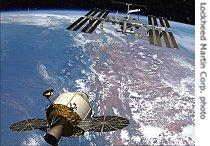2006年VOA标准英语-Houston Sees Economic Boost from Space Missions(在线收听)
By Greg Flakus
Houston
15 September 2006
 Artist rendition of the Orion crew exploration vehicle approaching the International Space Station |
||
----
Work on both Constellation and the new space vehicle projects will create jobs at all ten NASA facilities in the United States. But the program offices for both are here in Houston at the Johnson Space Center and that could be a boon for the local economy.
Bob Mitchell is director of Aerospace Marketing for the Bay Area Houston Economic Development Partnership, a non-profit organization that promotes investment and job growth in the area.
"NASA has made it very clear that they are not going to be able to do this on their own," he said. "They are going to need private companies to go out and do some of the things that are going to be required to make the Constellation program successful."
Mitchell says the NASA facility here in Houston already provides a big boost to the area that goes well beyond the number of people it directly employs.
"There are 3,000 civil servants working at the Johnson Space Center, but there are an additional 14,000 aerospace engineers and workers who support what goes on at the Johnson Space Center," he said.
Mitchell says demand for engineers and technical workers will grow as NASA develops the new space vehicle and prepares for the moon and Mars missions. One challenge is providing astronauts with water and oxygen for long periods of time in space. Scientists think these vital substances might be created from resources that could be extracted from the moon's surface.
Bob Mitchell says private companies will work with NASA on these issues.
"We are going to have to live off the moon, so there will be mining required to create water and oxygen, there are going to be telecommunication systems that are going to have to be a lot better than they are today, there is going to be a need for power systems, and you can go on and on about all the new industries that will flourish from this Constellation program," he explained.
Mitchell says new companies are locating here in Houston looking for some exotic ways to profit from space travel. One local company, Bigelow Aerospace, sees a future in space tourism and has a plan for a hotel in space.
Some of the ideas inspired by NASA's new programs may be many years away from development, but Johnson Space Center spokesman Kelly Humphries says NASA scientists are already working on parts of the Constellation program. He says the first big opportunities for private sector contract jobs will come from the Orion project.
"The majority of the contractor work force probably will be located in the Johnson Space Center-Houston area and at the Kennedy Space Center in Florida, where final integration prior to launch will be taking place," he said.
But Humphries says the increase in work related to Orion and Constellation will be offset by the diminishing need for people working on the shuttle program. He says unless Congress approves more money for NASA, the agency will have to make the current budget stretch to meet the new goals.
"We are going to have to wait and see what the country wants to do, but I think, overall, the folks here are anticipating a fairly flat budget for the space agency, in general terms, and we are going to have to work within those means," he said. "So, when you transition from the shuttle, you are probably looking at the personnel levels staying fairly close to what they are right now."
But Bob Mitchell says the very fact that the U.S. government is committed to such an ambitious program not only boosts the U.S. aerospace industry, but the U.S. image around the world.
"What it tells the world is that America is going to continue to explore space and America is going to continue to be the front-runner in the exploration of space," he said.
NASA's plan calls for the first launch of the Orion spacecraft no later than 2014, with a human moon landing by 2020. But agency spokesmen say planners are hoping to accomplish both goals well before those deadlines.